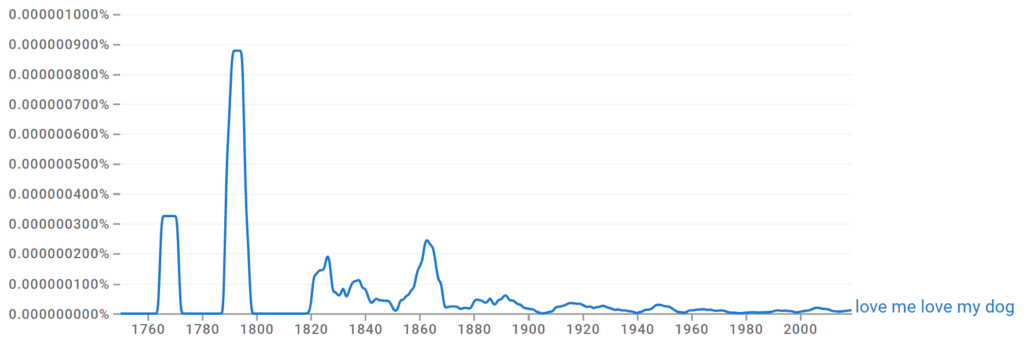Love me, love my dog means to accept someone or something unconditionally and without judgment. The expression has been in use since at least the 12th century, often used literally to express that a person and their pet come as a package deal.
When used as an idiom, it signifies the importance of embracing all aspects of a person. For example, my boss often stresses that despite our many differences, we should embrace a love me, love my dog attitude and accept each other to foster team unity.
Idioms like love me, love my dog are figurative expressions that add depth and emphasis to a sentence, creating analogies that underscore certain concepts. Learning how to use idioms is an excellent way to improve English speaking and writing skills.
Keep reading to learn more about this idiom’s meaning, origin, and how to use it in various examples.
Love Me, Love My Dog Meaning

Love me, love my dog is an idiom that means to accept someone unconditionally. To do this, you must wholeheartedly accept that person’s faults, quirks, and annoying habits.
This idiom underscores the essence of wholehearted acceptance, requiring one to take the good and the less favorable aspects of a person as an inseparable whole. The dog in the phrase is symbolic, representing all the attachments, qualities, or characteristics of a person that might not be immediately appealing or advantageous.
Thus, love me, love my dog promotes a holistic acceptance of an individual, advocating for the recognition and appreciation of the person in their entirety, complete with their unique blend of strengths and flaws.
Does Love Me, Love My Dog Always Have a Comma?
The phrase love me, love my dog always includes a comma when used as an independent clause or a standalone statement. The comma is required to separate the parallel elements of the phrase for clarity.
This comma serves to distinguish “love me” from “love my dog,” signaling their interconnectedness in a cause-and-effect relationship.
Love Me, Love My Dog Synonyms
- Accept me as I am
- Embrace the whole package
- Take me as I come
- Love me, love my quirks
- Love me, love my flaws
- Love me for who I am
- Love me, love my imperfections
- Love me, love my past
Examples of Love Me, Love My Dog Used in a Sentence

- If you want to be my friend, love me, love my dog.
- My motto is “love me, love my dog”; my passions are part of who I am.
- In our team, we follow the “love me, love my dog” rule for mutual respect.
- “Love me, love my dog”—that’s what he said about his unusual hobby.
- As a coach, I encourage my players to embrace unity and respect for one another and remind them, “Love me, love my dog. We win as a team.”
Love Me, Love My Dog Origins

The first documented use of the phrase love me, love my dog is attributed to St. Bernard of Clairvaux. During a sermon for the Feast of St. Michael the Archangel in the 12th century, he stated, “Dicitur certe vulgari proverbio: Qui me amat, amat et canem meum,” which translates as “It is said truly in a common proverb: who loves me, also loves my dog.”
As St. Bernard was citing an already-existing proverb, the saying is likely much older. However, his reference brought it into common parlance and influenced its modern usage.
It is also important to note that St. Bernard of Clairvaux is not the St. Bernard of our beloved Saint Bernard dog. St. Bernard of Menthon (Montjoux), who died in 1081 A.D., is attributed to the naming of that breed.
Further documentation of the literal and figurative use of love me, love my dog appeared in the 15th century in the Wagstaff Miscellany. This text recorded historical events, prayers, recipes, proverbs, and other significant ideas of the time. The idiom was referenced again in The Proverbs of John Heywood in 1546:
“What man, love me, love my dog.”
Let’s Review
Love me, love my dog is a time-honored idiom signifying the unconditional acceptance of a person, including their faults and quirks. This expression, rooted in a 12th-century proverb, emphasizes the holistic recognition of individuals in their entirety. When used as an independent clause, the phrase always includes a comma for clarity.
Learning idioms like this is valuable for enhancing English language skills. Embracing its message fosters unity and respect. In summary, love me, love my dog underscores the importance of accepting someone without judgment, regardless of their imperfections.
